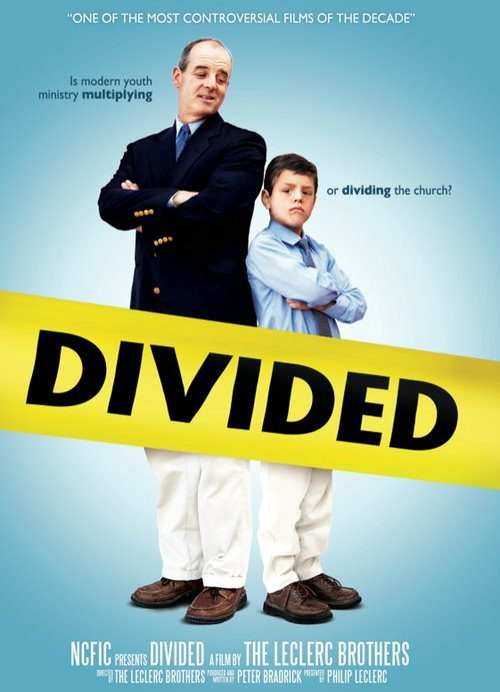In A Response to Divided: The Film & Family Integration (Part 1), I critiqued the movie Divided.
In part 2, I want to offer some solutions.
Divided: The Movie, while bringing to light a much needed discussion, provides limited answers. Simply tearing down every wall of demographic separation within the church does not fully address the problem. There must be sweeping changes in the way we view youth ministry.

John Maxwell is correct when he says that “everything rises and falls on leadership.”
First, the Change must begin with the pastor and other leaders of the church. There must be a paradigm shift in the way the leaders view the youth ministry and the youth minister. If they are not convinced, little can be done.
Second, we must view youth not as members of a particular sub-group, but as fully functioning members of the church. I am adamantly against youth Sundays—the practice where, in attempts to get youth accustomed to ministry, the church lets them run things for a Sunday. This is offensive. It suggests that they are, in fact, not real members, but a group who, under the graces of the church, is allowed to service once a year. If youth are willing and able to serve, let them serve regularly—not as youth, but as Christians! If we can get them involved as Christians in ‘Big church’ then integration won’t be such a culture shock after graduation.
Third, we must create demographically diverse small groups and ministry opportunities. Whether its Sunday school, weekday small groups, or men’s breakfasts, we must get our youth mingling with our adults. If we treat our youth like kids, they’ll act like it. When if we treat them like members of the body of Christ, many will rise to the occasion. Divided: The Movie is right on here. Too much age segregation strips teenagers of the ability to rub shoulders with mature christians.
Fourth, we must abolish youth Sunday services. This is the core issue in The Divided film. There is far too much demographic separation in our churches. We are creating churches within churches. Even children’s church past a certain grade is problematic (but that is another issue). I believe sixteen year olds and and sixty-six year olds of the same church should be worshiping and learning and serving together.
Some might object that the language of an adult service is far too advanced for teenagers, and that the topics presented are not relevant. Some years ago I listined to an Alistair Begg sermon on Christian education. I hate to quote him without providing a reference, but he talked about the importance of having children in the main service. He agreed that they won’t understand all of it, but they will understand some of it.
As far as the main service not being relevant, how can the preaching of the Bible not be relevant to a fifteen year old? If the preaching in ‘Big church’ is not relevant to a fifteen year old, it’s probably not relevant to a fifty year old. That’s a preaching problem, not a youth problem.
Fifth, we must staff accordingly. Personally, I would never advocate hiring a youth minister or youth pastor, but I would advocate hiring or appointing a family pastor. The title speaks volume.
Unfortunately, in the industry of professional ministry, the youth minister is often viewed as the Diet Coke of the pastorate. The youth minister is the pastor-in-training. They exist in order to learn the ropes so that, after having matured, they can climb the ministerial ladder into a real job–like a senior or associate pastor. I don’t agree with this view, but it seems common.
The most significant metric to appraise the ministerial value of the youth minister is his pay. Most youth ministers are part time and paid peanuts. As a result, the turnover rate is quite high. The standard answer for youth ministry turnover rate is 18 months, but that number have been challenged. It’s not only an issue of pay, but of respect and influence. No offense to any youth pastor (I was a youth pastor for 6 years), but it seems to be the least respected job in the church.
Since most churches in North American are under 100, the majority of them cannot hire a second full time staff. Nonetheless, If I were in a position to hire additional staff to work with younger people, this how I would structure it:
- Create a title that accurately describes the task. Family Pastor certainly works.
- Communicate to the church that this is a respected, pastoral position, designed to reach families. This is not an intro job for someone wanting to do real ministry later. The compensation must be consistent with every other associate pastor position.
- Make every effort to hire someone for the long haul. A new youth minister every other year ruins morale and ultimately creates indifference.
- The Family pastor would actively pursue the families of the unchurched youth.
- The Family pastor would work with other ministries of the church to get teenagers integrated, not as youth, but as Christians.
- The Family pastor would align his ministry with the pastor and other leaders. So often the church is moving in one direction, while the ‘youth guy’ off doing his own thing.
To summarize, our churches need to get our adults and youth aligned in fellowship, worship, discipleship, worship, ministry, and outreach. There is one body of Christ. The young can learn from the old, while the old learn from the young.
A Response to Divided: The Film & Family Integration (Part 1)
A Response to Divided: The Film & Family Integration (Part 2)